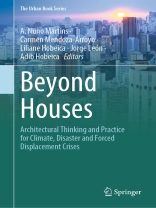This book delves into the complexities of urban crises, focusing on the efforts of researchers and practitioners who confront precarious housing and forced displacement. Originating from the 8th International Conference on Building Resilience (convened in November 2018 in Lisbon, Portugal), this book examines challenges across diverse contexts and geographies, including Chile, India, Kenya, Mexico, Portugal, and Syria. Structured in three parts, the book’s 12 chapters address disaster prevention and recovery, humanitarian architecture, and issues related to housing, migration, and urban forced displacement. The narratives emphasize vulnerabilities, community-driven design, and cross-cultural perspectives, comprehensively reviewing global urban planning, slum upgrading, and incremental housing strategies. The contributions engage readers with practical insights for mitigating urban vulnerability and intellectual analyses that consider the complexities of life amid systemic injustices. Ultimately, the authors suggest integrating architectural practice with social work within communities to address intricate urban housing challenges.
Inhoudsopgave
Researching crises and solutions with urgency and agency: An introduction.- Part 1: Mainstreaming risk reduction in recovery and reconstruction.- Disentangling governance for nature-based restoration projects.- Female leadership and everyday hazards: Care practices and solidarity networks in Campamento Dignidad.- Structural measures for wildfire risk reduction in informal contexts in Chile.- Analyzing urban Tsunami evacuation through evacuees’ spatial behaviors.- Part 2: Enhancing inclusion through humanitarian architecture.- Integrating soft infrastructure in design to build community resilience in Puerto Rico.- Can a gender perspective fulfill the end-user’s needs in housing reconstruction projects?.- Leaving the slum: International collaborative design initiatives to shape capabilities during resettlement.- Architecture and incremental housing in climate change and pandemic times in Lisbon and Bhopal informal settings.- Part 3: Disentangling urban forced displacement challenges.- Displacement as precarious inhabiting: Care and repair at the urban margins.- Improving post-conflict self-recovery programming: Addressing the complexities in Syria.- Waiting in non-places: The spatialization of displacement discourses.- Can urban factors enhance the integration of asylum seekers in cities?.
Over de auteur












